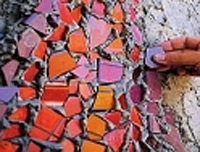Multiethnic
“SO WHAT ARE you exactly?”
I’m asked that often. When people see my dark-black and curly hair, my somewhat “almond-shaped” eyes, my pale skin with a yellow undertone— and yet freckles—they wonder. They can’t place my ethnicity in a box, so they feel unsettled, maybe even threatened.
Depending on my mood, I choose one of a few answers. If I’m feeling sarcastic: “I’m human, thanks. And you?” Or if I’m feeling cryptic: “ Exotic, obviously.” If I’m feeling sarcastic and preachy: “Me? I’m part of the Colossians 3:12 ‘Beloved Community,’ part of God’s people that he loves from the center of his being.”

Image via Gage Skidmore/flickr.com
A decade ago, a critic accused me of writing a book about a “nonexistent” threat from the religious right. One reviewer called my work a “paranoid rant,” while another detractor wrote my “alarmist” views were “exaggerated and implausible.”
In The Baptizing of America: The Religious Right’s Plans For The Rest Of Us, published in 2006, I had warned that a well-financed and highly organized group of religious and political leaders was seeking to impose their narrow extremist beliefs and harsh public policies on the United States, even as our nation’s population was increasingly multireligious, multiethnic, and multiracial.
AS AN EVANGELICAL pastor of a multiethnic church in New York City, I often find myself at the intersection of lively discussions about race. These conversations almost inevitably lead to a familiar question: What does the church do now? Maybe stated another way, “How do we work toward the dream of the beloved community?” This is why I find Edward Gilbreath’s Birmingham Revolution: Martin Luther King Jr.’s Epic Challenge to the Church to be a timely and necessary read.
While many books have been written on Dr. King and civil rights, Birmingham Revolution places King’s faith at the foreground of the writing. This is an important distinctive as King has often been co-opted, by conservative and liberal agendas alike. Yet history cannot deny that prayerful action, and a gospel that took seriously the social dimensions of human life, were at the very heart of King’s theology.
Birmingham Revolution hones in on the year 1963—a time when the Southern Christian Leadership Conference took the civil rights efforts into the bowels of structural racism. Brown vs. Board of Education had provided an important Supreme Court victory in 1954, but many forms of local resistance to desegregation prevailed in the South.
To compound the drama, many advocates in Alabama, both black and white, believed further progress should happen through legal means. They had a misplaced confidence that local structures would uphold federal law, despite the continued presence of the KKK and other such groups. Gilbreath explains Birmingham’s defining moment not only in confronting segregation, but also in challenging the subtler, unwittingly complicit voice of the moderate.
My biracial niece, Hannah, and I were talking about Martin Luther King, Jr., and what she had learned about him in school. She was only in second grade then. She was piled in the back seat of the minivan, along with my kids Caitlin and Cameron, and their cousin Austin. We were on our annual spring break escapade to the Travis County fair, Children’s museum, San Antonio Zoo, and every place in between. I asked her about what Martin Luther King did. ...
Hannah and myriad others like them in the Millennial generation, embody Dr. King’s original vision. The very seed of the dream has germinated. They carry it in their DNA, literally. In fact, they are the living, breathing incarnation of interracial harmony. Come to think of it, no one wants to choke on a seed. We prefer the fruit. In the same way, we expect words to go beyond pie-in-the-sky imagination. We want them to be fleshed out into reality.
My mother is an immigrant from Korea who has worked as a janitor in a hospital and waitress in a Korean restaurant. My father is a white guy from a small town in Tennessee who has been a soldier and dock worker.
[Click here to see all posts in this conversation on New Monastics and race.]
 I've been following the recent online conversation about racial reconciliation and the New Monastics rather closely. Why? Because it is a conversation whose time has come. I honestly believe that [...]
I've been following the recent online conversation about racial reconciliation and the New Monastics rather closely. Why? Because it is a conversation whose time has come. I honestly believe that [...]

